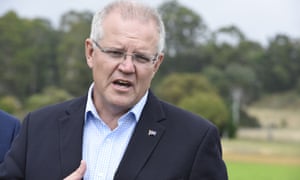Extract from The Guardian
PM to announce ‘climate solutions fund’ to appeal to voters concerned about Coalition’s record
Scott Morrison
will attempt to appeal to voters deeply concerned that the Coalition
has been been wreckers on climate change by rebadging Tony Abbott’s
emissions reduction fund as a “climate solutions” fund – with $2bn to be
rolled out over 10 years.
Attempting to draw a line over years of destructive in-fighting within the Coalition that has cruelled various emissions reduction policies, the prime minister will use a speech in Melbourne on Monday to launch a new package of measures on climate change, saying his government acknowledges and accepts the challenge “but we do so with cool heads, not just impassioned hearts”.
The emissions reduction fund is a vestige of Abbott’s heavily criticised Direct Action policy. Funded by taxpayers initially at $2.5bn, the ERF pays farmers and businesses to cut carbon dioxide pollution to below what it would otherwise be. But an investigation by Guardian Australia last year found it was often difficult to determine if the fund was offering value for money.
Malcolm Turnbull, who once branded the approach “a recipe for fiscal recklessness on a grand scale”, let the ERF dwindle to almost nothing as he pursued policy alternatives, including the national energy guarantee resisted by conservatives and dumped by Morrison shortly after he took the Liberal leadership last year.
Morrison will confirm on Monday the ERF will be rebadged a “climate
solutions fund” and given a 10-year funding profile. The rebooted fund
will partner with farmers, local governments and businesses to deliver
“practical climate solutions” across the economy that reduce carbon
emissions.Attempting to draw a line over years of destructive in-fighting within the Coalition that has cruelled various emissions reduction policies, the prime minister will use a speech in Melbourne on Monday to launch a new package of measures on climate change, saying his government acknowledges and accepts the challenge “but we do so with cool heads, not just impassioned hearts”.
The emissions reduction fund is a vestige of Abbott’s heavily criticised Direct Action policy. Funded by taxpayers initially at $2.5bn, the ERF pays farmers and businesses to cut carbon dioxide pollution to below what it would otherwise be. But an investigation by Guardian Australia last year found it was often difficult to determine if the fund was offering value for money.
Malcolm Turnbull, who once branded the approach “a recipe for fiscal recklessness on a grand scale”, let the ERF dwindle to almost nothing as he pursued policy alternatives, including the national energy guarantee resisted by conservatives and dumped by Morrison shortly after he took the Liberal leadership last year.
According to projections done last December, the government will count a 367 megatonne abatement from carry-over credits (an accounting system that allows countries to count carbon credits from exceeding their targets under the soon-to-be-obsolete Kyoto protocol periods against their Paris commitment for 2030) to help meet the 2030 target.
It is also factoring in emissions reduction from Turnbull’s pet project, the Snowy 2.0 expansion (which the Morrison government has not yet formally signed off on); energy efficiency measures; an electric vehicle strategy (that it has not yet unveiled); the rebadged climate solutions fund; additional hydro projects and just under 100Mt of abatement from “technology solutions” (which aren’t specified) and “other sources of abatement” such as projects under development but not yet contracted.
The government says examples of projects to be assisted under its rebadged ERF will include funding for remote indigenous communities to reduce severe bushfires in rural and remote areas; support for small business to replace lighting, air conditioning and refrigeration systems to help reduce energy costs; drought proofing on farms; and support for local communities to reduce waste and increasing recycling rates.
Liberal MPs have been lobbying the leadership to pull together a package of climate measures, with many reporting a significant voter backlash about the Coalition’s destructive record on climate policy.
Strategists for both major parties report that after a summer characterised by extreme weather and prolonged heatwaves, voters are more concerned about climate change now than they have been at any time since 2007.
Liberals are also under fire in their electoral heartland from small “l” liberal independents campaigning on the Coalition’s poor record on climate change, highlighting past behaviour like cutting the renewable energy target and attempting to abolish agencies like the Clean Energy Finance Corporation and Arena.
Morrison will on Monday attempt a course correction, saying the government is committed to “meaningful, practical action on climate change, without damaging our economy or the family budget”.
“We will continue to play our part in meeting the global challenge of climate change in the 21st century,” the prime minister will say. “We will do so without taking a sledgehammer to our economy. Without putting our electricity market at risk. Without putting pressure on electricity prices. Without destroying jobs in our traditional industries and in regional Australia.
“This is the responsible and balanced course. And we must stay the course”.

No comments:
Post a Comment